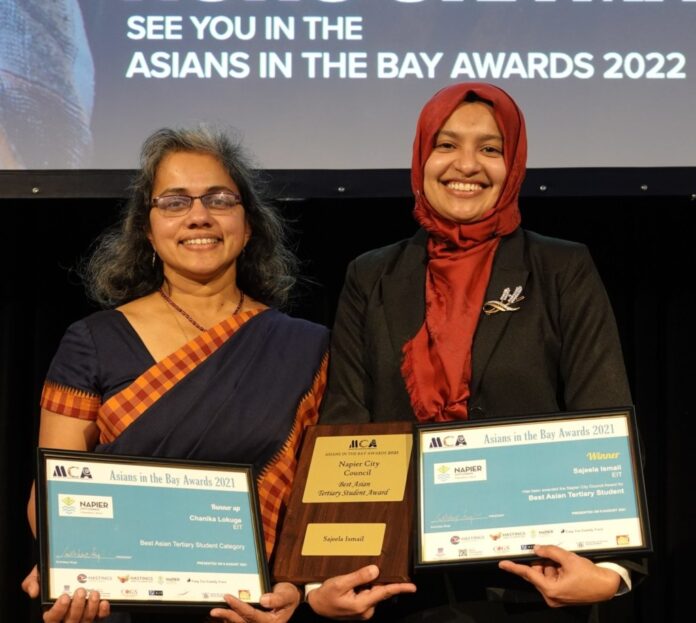Source: Eastern Institute of Technology – Tairāwhiti
5 mins ago
: EIT students Chanika Lokuge (left) and Sajeela Ismail (right) were runner-up and winner of the Best Asian Tertiary Student category respectively at the recent Asians in the Bay Awards.
An EIT Master of Health Science graduate, who was recently recognised at the prestigious Asians in the Bay Awards, is driven to finding solutions for children’s oral health problems.
Sajeela Ismail came from Kerala in the south of India as an international postgraduate student just before the COVID-19 lockdown last year. Since then, she has completed her second Master’s degree, volunteered for local community groups, worked on a major food research project and was recognised as Best Asian Tertiary Student in this month’s Asians in the Bay Awards. Another EIT student, Chanika Lokuge, was the runner up.
Saleeja says she is honoured to have received the award.
“It was a fantastic evening because there were all these different communities that came together. The diversity was fabulous.”
The mother of two boys, who live with their grandparents in India, Sajeela, 38, says she misses them a lot, but saw EIT as the right institute for her to further her career. She hopes to be re-united with her 8-year-old and 13-year-old, who she keeps in regular contact with, soon.
As for her studies, her thesis was on a supervised toothbrushing programme in schools.
“I am a Paediatric Dentist from India and I focused on improving oral health of children, so I was just trying find a correlation to that in the New Zealand context.”
“While similar programmes have been done in other parts of the world, there was just one published study of this kind in New Zealand between 2000 and 2021. So, I wanted to check the feasibility and how relevant that is to the New Zealand context.”
Sajeela finished her Master’s, for which she received a Distinction, this year and hopes to attend next year’s graduation ceremony.
She says that after her graduation in dentistry in India, she specialised in paediatric dentistry, which was a three-year Master’s course.
Her research report was a review of existing supervised toothbrushing programmes in schools to lay the foundation for one to be rolled out. She found that there were important aspects that needed to be addressed for any supervised programme in schools to be successful.
“We need the support of the schools, the parents and the children, as well as funding to provide toothbrushes and toothpaste. It is an after-lunch programme that is practiced around the world and is a matter of two or three minutes, maximum.”
Sajeela is now focused on getting a research role and a visa to ensure she can remain in New Zealand.
She also is not averse to studying further.
“I do plan to do a PhD in the long run,” says Sajeela.
As if she does not have enough on her plate, Sajeela also volunteers for community organisations including Volunteering Hawke’s Bay and the Habitat for Humanity shop in Hastings. She also worked part-time as a research assistant for Nourishing Hawke’s Bay: He wairua tō te kai – a collaborative project between EIT and the University of Auckland, which aims to improve food environments for children in Hawke’s Bay.
Sajeela’s supervisor, Dr Anita Jagroop-Dearing, International Postgraduate Programme Coordinator in EIT’s School of Health and Sport Science, says: “Over the 18 months that I worked with Sajeela as my student, she has been nothing but exceptional. She has always strived for perfection, so I was not at all surprised that she attained all A grades in her postgraduate courses.”
“It was my honour and pleasure to present her with the School’s letter of ‘Acknowledgement of Outstanding Achievement in the Master of Health Science Programme’,” Dr Jagroop-Dearing said.
“She is an asset to New Zealand, and I look forward to seeing what additional achievements she attains here. Most importantly, I hope that she can be reunited with her boys as soon as the Covid-19 border restrictions are lifted”.



